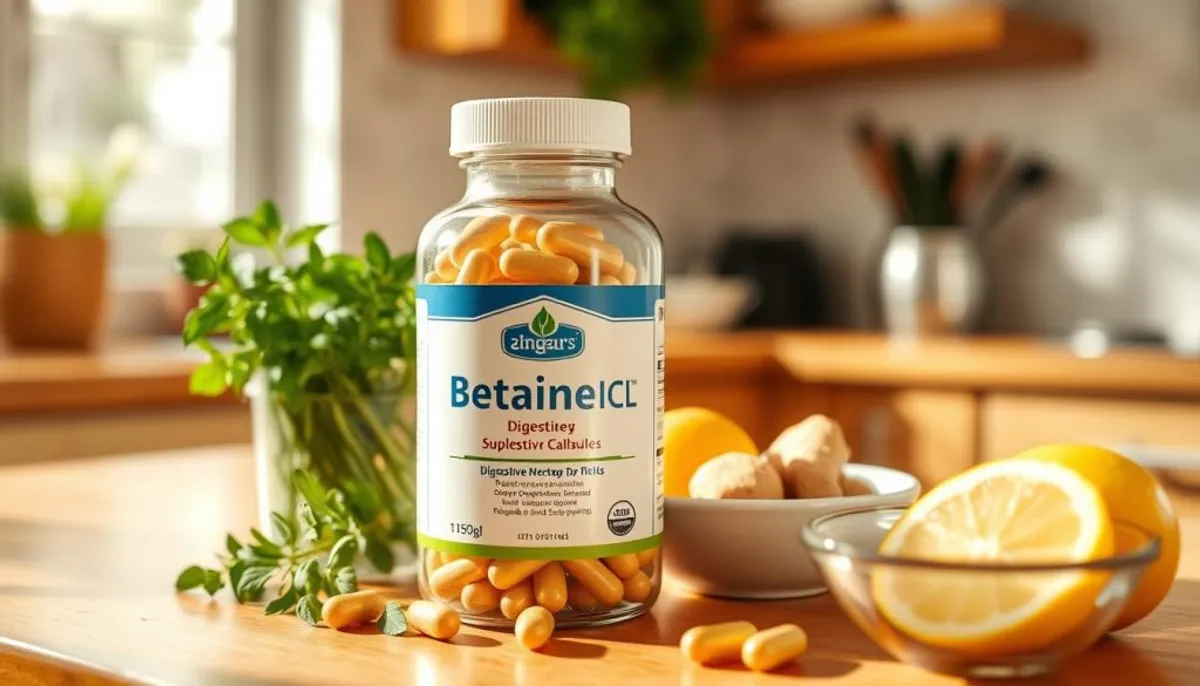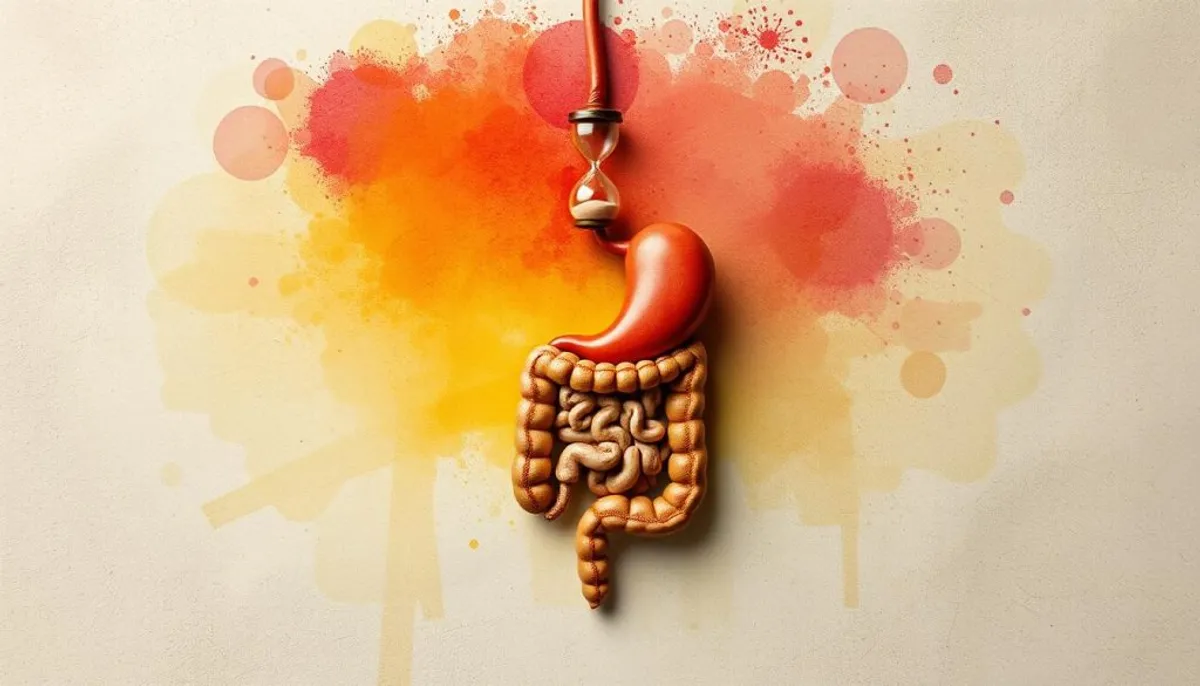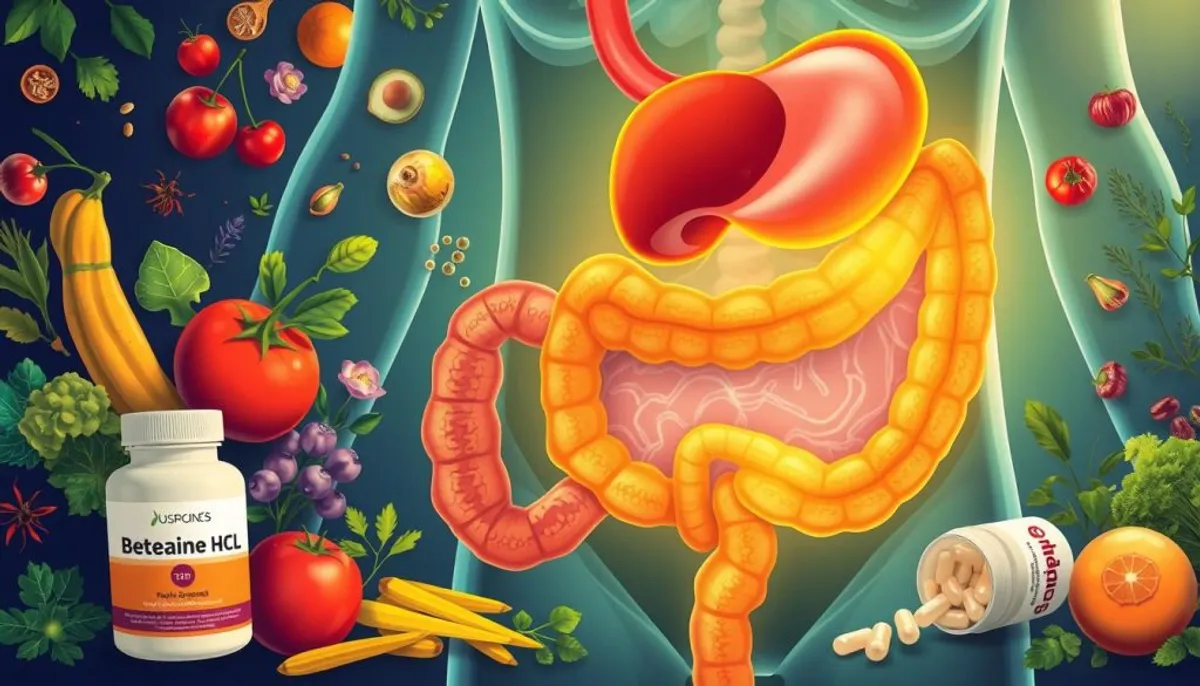Betaine HCl supplementation has emerged as a favored remedy for enhancing digestive health and stomach acid levels. This comprehensive guide delves into the ideal duration for betaine HCl supplementation, its advantages, and critical safety factors to consider.
Individuals often resort to betaine HCl to address symptoms of low stomach acid. It is essential to recognize that the length of supplementation can differ significantly based on personal requirements and the root causes of digestive problems.

Dr. Wright, a renowned authority in the field, advocates for betaine HCl dosages spanning from 3,250 to 4,550mg per meal. Some may necessitate doses exceeding 5,000mg for optimal outcomes. Determining the appropriate dosage often entails a trial-and-error approach, beginning with a minimal amount and incrementally increasing until noticeable enhancements are observed.
Key Takeaways
- Betaine HCl supports digestive health and stomach acid production
- Supplementation duration varies based on individual needs
- Dosage typically ranges from 3,250 to 4,550mg per meal
- Start with a low dose and increase gradually
- Consult a healthcare professional before starting supplementation
- Monitor symptoms and adjust dosage as needed
Understanding Betaine HCl and Its Role in Digestion
Betaine HCl is essential for enhancing stomach acid production. Derived from plants like sugar beets, it is crucial for individuals with low stomach acid. Its role in digestion is significant and warrants exploration.
What is Betaine HCl?
Betaine hydrochloride (HCl) is a dietary supplement that provides hydrochloric acid. It increases stomach acidity for about an hour after consumption. This increase can alleviate symptoms of low stomach acid, including bloating, gas, and reflux.
The Science Behind Stomach Acid Production
Stomach acid production is a complex process vital for digestion. Low stomach acid, or hypochlorhydria, can cause numerous health problems. Contributing factors include age, certain medications, and medical conditions.
Key Functions of Hydrochloric Acid in Digestion
Hydrochloric acid has several critical roles in the digestive system:
- Breaks down proteins
- Enhances nutrient absorption
- Protects against harmful bacteria
- Supports overall gut health
| Nutrient | Impact of Low Stomach Acid |
|---|---|
| Iron | Decreased absorption |
| Calcium | Reduced uptake |
| Vitamin B12 | Impaired absorption |
| Magnesium | Limited absorption |
Betaine HCl supports stomach acid production, enhancing digestion and overall health. It improves nutrient absorption, promotes gut health, and may alleviate various digestive issues related to low stomach acid.
Signs and Symptoms of Low Stomach Acid
Low stomach acid, or hypochlorhydria, manifests through a variety of digestive issues. Its symptoms often overlap with those of other conditions, complicating diagnosis. Common indicators include bloating, heartburn, and upper abdominal pain. Difficulty swallowing or feeling full quickly upon eating are also prevalent.
Nutrient deficiencies are a dire consequence of hypochlorhydria. Your body’s ability to absorb iron, calcium, vitamin B12, and other vital nutrients is compromised. This can result in fatigue, weakness, and severe anemia in extreme cases.
Hypochlorhydria-related digestive issues extend beyond mere discomfort. Frequent burping, gas, and undigested food in stool are common. Some individuals may experience diarrhea or constipation. These symptoms can drastically reduce your quality of life and overall health.
If you’re experiencing persistent digestive problems, consider hypochlorhydria as a potential cause. Early recognition of these signs is vital for effective treatment and prevention of long-term complications. Always seek a healthcare provider’s guidance for accurate diagnosis and management of hypochlorhydria symptoms.
The Connection Between Age and Stomach Acid Production
As we age, our bodies undergo significant changes, including shifts in digestive function. One notable change is the decline in stomach acid production, known as age-related hypochlorhydria. This condition can have profound effects on elderly digestion and overall health.
Age-Related Decline in Acid Production
Research indicates that older adults experience a decrease in gastric acid secretion compared to younger individuals. While fasting stomach acid levels may be similar across age groups, the time needed to re-acidify the stomach after meals is significantly longer in older adults. Younger people typically re-acidify in about 42 minutes, while older individuals may take up to 89 minutes.

Impact on Nutrient Absorption
The reduced acid production in elderly digestion can lead to poor nutrient absorption. This is concerning for essential nutrients like protein, vitamin B12, and minerals. The body’s ability to break down and absorb these vital components is compromised when stomach pH levels are not optimal.
pH Levels Throughout Life Stages
Stomach pH levels naturally fluctuate throughout life. Here’s a breakdown of average stomach pH levels at different life stages:
| Age Group | Fasting pH | Post-Meal pH |
|---|---|---|
| Infants | 4.0 – 5.0 | 6.0 – 7.0 |
| Young Adults | 1.5 – 2.0 | 3.0 – 4.0 |
| Elderly (60+) | 2.0 – 3.0 | 4.0 – 5.0 |
Understanding these age-related changes in stomach acid production is crucial for addressing digestive issues and maintaining optimal health as we age. Proper management of stomach pH levels can significantly improve elderly digestion and overall well-being.
How Long to Supplement with Betaine HCl
Establishing the duration for betaine HCl supplementation is paramount for effective digestive support. The timeframe for acid replacement therapy varies, influenced by individual needs and the underlying causes of low stomach acid.
Short-term Supplementation Guidelines
Some individuals may find short-term betaine HCl supplementation adequate. A digestive support timeline of 4-6 weeks can serve as an initial assessment period. During this time, it is essential to monitor symptoms and adjust the dosage as necessary.
Long-term Usage Considerations
Others may necessitate prolonged betaine HCl supplementation. Long-term use necessitates professional guidance. Regular health check-ups, every 3-6 months, are crucial for ongoing evaluation of needs and potential side effects.
Monitoring Progress and Adjusting Duration
It is vital to track your progress to determine the optimal duration for betaine HCl supplementation. Maintaining a symptom diary and noting improvements in digestion is advisable. Consult your healthcare provider if symptoms persist or deteriorate.
| Supplementation Duration | Recommended Actions |
|---|---|
| Short-term (4-6 weeks) | Monitor symptoms, adjust dosage |
| Medium-term (3-6 months) | Regular check-ups, assess effectiveness |
| Long-term (6+ months) | Ongoing evaluation, consider alternative treatments |
It is important to note that betaine HCl significantly lowers gastric pH, with effects lasting about 73-77 minutes. Adjust your supplementation schedule appropriately for optimal digestive support.
Proper Dosage Protocol and Timing
Accurately determining the betaine HCl dosage is essential for effective meal-time acid support. Begin with one 600-700 mg capsule per meal. If you don’t feel a warm sensation in your stomach, increment by one capsule at your next meal. Continue this progression until you experience warmth or reach seven capsules.
Supplement timing is pivotal in maximizing benefits. Administer betaine HCl during meals, rather than before or after. This ensures optimal digestion support when your body is most in need.
Adjust your betaine HCl dosage according to meal size. For larger meals, increment by one extra capsule. For smaller ones, decrement by one. If you start feeling warmth at your usual dose, decrease by one capsule for that meal size.
Remember, individual needs vary. Some may require higher doses due to low stomach acid production. Others might be more sensitive and need lower doses. Listen to your body and adjust as needed for effective meal-time acid support.
| Meal Size | Recommended Dosage Adjustment |
|---|---|
| Regular meal | Standard dose |
| Large meal (e.g., Thanksgiving) | Add 1 capsule |
| Small meal | Reduce by 1 capsule |
Benefits of Betaine HCl Supplementation
Betaine HCl supplementation brings numerous advantages for digestive health. This compound, naturally occurring in foods like beets and spinach, has been a long-standing solution for low stomach acid issues.
Improved Nutrient Absorption
One of the primary benefits of betaine HCl is its role in enhancing nutrient absorption. Research indicates that low stomach acidity can hinder the absorption of vital nutrients such as iron, vitamin B12, magnesium, vitamin C, and calcium. By boosting stomach acidity, betaine HCl facilitates better nutrient uptake by the body.
Enhanced Protein Digestion
Betaine HCl is essential for protein digestion. It activates enzymes crucial for protein breakdown, creating an ideal environment for enzymatic activity. This results in more efficient protein digestion and better protein utilization within the body.

Prevention of Bacterial Overgrowth
Adequate stomach acid is vital for maintaining a balanced gut microbiome and preventing bacterial overgrowth in the small intestine. This action reduces the risk of SIBO (Small Intestinal Bacterial Overgrowth). Studies affirm that proper stomach acid levels, facilitated by betaine HCl, contribute to a healthier gut environment.
| Benefit | Description |
|---|---|
| Nutrient Absorption | Improves absorption of iron, B12, magnesium, vitamin C, and calcium |
| Protein Digestion | Activates enzymes for efficient protein breakdown |
| Gut Health | Prevents bacterial overgrowth and maintains balanced microbiome |
| pH Balance | Helps maintain optimal stomach acidity levels |
Safety Considerations and Contraindications
Understanding the safety of betaine HCl is paramount, as it pertains to who should avoid it and potential side effects. While beneficial for many, there are individuals who must exercise caution.
Who Should Avoid Betaine HCl
Those with active peptic ulcers should avoid betaine HCl, as it can exacerbate their condition by increasing stomach acidity. Individuals with a history of gastritis or sensitive stomachs should also consult a healthcare provider before use.
Potential Side Effects
Common side effects of betaine HCl include:
- Burning sensation in the stomach
- Nausea
- Diarrhea
- Body odor
To mitigate these effects, begin with a low dose and incrementally increase. It is crucial to take betaine HCl with meals, not on an empty stomach.
Drug Interactions
Betaine HCl may interact with specific medications. It is imperative to consult your healthcare provider before initiating supplementation, notably if you are taking:
- Non-steroidal anti-inflammatory drugs (NSAIDs)
- Proton pump inhibitors
- H2 blockers
Grasping the contraindications of supplements is vital for safe betaine HCl use. Adhere strictly to dosing instructions and store the supplement at room temperature, away from heat and moisture.
Lifestyle Factors Affecting Stomach Acid Levels
Your daily habits significantly influence stomach acid production. The food you consume and stress management are crucial for digestion. We will explore essential factors impacting your stomach’s acid levels.
Diet is a pivotal factor in stomach acid production. Consuming whole foods promotes healthy digestion. In contrast, processed foods can disrupt your stomach’s acid balance. Foods like ginger can enhance digestion. A study revealed that ginger powder, taken in 3 grams daily for 4 weeks, significantly improved indigestion symptoms.
Stress has a detrimental effect on digestion. Stress can lead to reduced stomach acid production. This results in poor digestion and nutrient absorption. Engaging in relaxation techniques, such as meditation or deep breathing, can help maintain digestive health.
Certain medications can also affect stomach acid levels. Long-term use of acid-reducing drugs can decrease stomach acid production. This might necessitate the use of supplements like betaine HCl. A study demonstrated that 1500 mg of betaine HCl increased stomach acidity in individuals with low levels.
- Eat a whole-food diet
- Manage stress through relaxation techniques
- Be aware of medication effects on stomach acid
By focusing on these lifestyle factors, you can support healthy stomach acid levels and enhance your digestion.
Complementary Approaches to Stomach Acid Support
Supporting stomach acid naturally extends beyond supplements. Lifestyle adjustments and natural remedies can significantly enhance digestive health. Let’s examine some effective strategies.
Dietary Modifications
Eating habits are pivotal in natural digestive support. Incorporating bitter foods into your diet stimulates acid production. Leafy greens, citrus fruits, and apple cider vinegar are excellent options. Bitters for digestion, such as dandelion or gentian root, can be consumed as tinctures before meals.
Natural Acid Production Stimulants
Certain foods and beverages can naturally elevate stomach acid levels. Coffee, for instance, may increase gastric acid secretion. Ginger and lemon water are also beneficial for digestion. Herbal teas like peppermint or chamomile can soothe the digestive system.
Stress Management Techniques
Stress reduction is crucial for gut health. High stress levels can impede digestion. Engage in deep breathing exercises, meditation, or yoga to calm your nervous system. Regular physical activity also aids in stress management and promotes healthy digestion.
| Approach | Benefits | Examples |
|---|---|---|
| Dietary Modifications | Stimulates natural acid production | Bitter foods, apple cider vinegar |
| Natural Stimulants | Boosts gastric secretion | Coffee, ginger, lemon water |
| Stress Management | Improves overall digestive function | Meditation, yoga, exercise |
By integrating these methods with betaine HCl supplementation, you can develop a comprehensive strategy for optimal digestive health. It’s essential to listen to your body and seek personalized advice from a healthcare professional.
Conclusion
The efficacy of betaine HCl in enhancing digestive health has been extensively validated through scientific research. Studies reveal its potential to significantly reduce total body fat mass by 2.53 kg and decrease body fat percentage by 2.44%. These outcomes underscore the significance of adopting personalized supplementation strategies for achieving optimal results.
Normal hydrochloric acid production in the stomach varies between 20-30 mmol per hour, equivalent to 3000-4500mg of Betaine Hydrochloride. Research demonstrates that Betaine HCl can rapidly lower gastric pH from 5.2 to 0.6 within 30 minutes, maintaining this effect for approximately 77 minutes. This capability enhances digestion during meals and contributes to overall digestive health optimization.
While betaine HCl supplementation is generally considered safe and well-tolerated, it is essential to consider individual needs and health conditions. The duration and dosage of supplementation must be customized to each person’s unique requirements. By adopting personalized supplementation approaches, individuals can maximize the benefits of betaine HCl and effectively support their digestive health.
RelatedRelated articles



